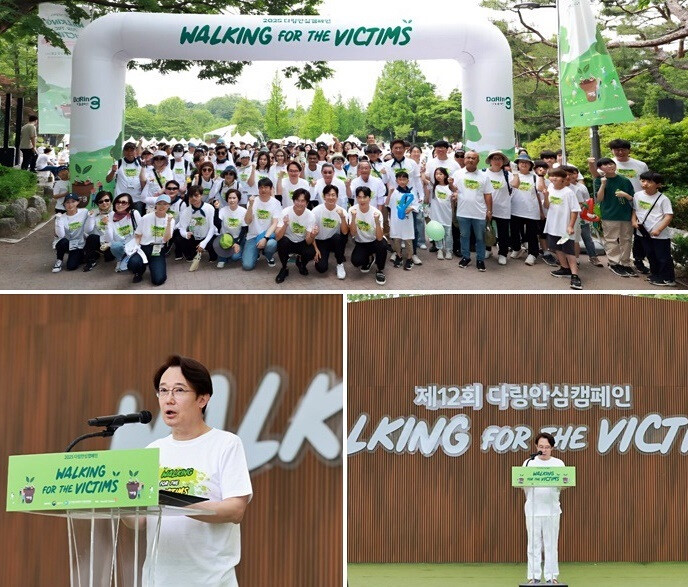
On Saturday, May 31, 2025, at 10:30 AM, the Ministry of Justice and the National Association of Crime Victim Support Organizations (Chairman Kim Gap-sik) successfully held the 12th 'Daring Ansim Campaign' at the Open Stage of Seoul Children's Grand Park in Gwangjin-gu, Seoul. 'Daring' is a compound word combining 'da' (다), meaning 'all,' and 'ring,' symbolizing 'oneness.' It signifies the hope that all citizens will unite to become a strong fence of support for crime victims.
This campaign is a public interest activity designed to encourage public participation in walking, support the healing and recovery of crime victims, and foster social interest in the protection and support of crime victims. Since its inception in 2014, it has been held consistently every year, contributing to raising awareness of the importance of protecting the human rights of crime victims. With over 250,000 violent crimes occurring annually, the need for comprehensive support encompassing victims and their entire families is increasingly emphasized.
Event Participants and Online Engagement
Approximately 1,000 people, including Seung Jae-hyun, Director-General of the Human Rights Bureau at the Ministry of Justice, Kim Gap-sik, Chairman of the National Association of Crime Victim Support Organizations, crime victim support workers, and citizens, participated in the event. Notably, the 'Sharing Walk Challenge' event, held online via the 'Walkon app' from May 9, saw a total of 14,593 citizens participate, demonstrating strong interest and support for crime victim protection and assistance. The walking challenge, utilizing the Walkon app, provided an opportunity for health promotion and social contribution, drawing voluntary participation from citizens.
Campaign Program and Key Speeches
The campaign began with an opening address by Seung Jae-hyun, Director-General of the Human Rights Bureau at the Ministry of Justice, followed by promotions for crime victim protection and support systems. Subsequently, a 'Sharing Walk' was held along the walking trails of Seoul Children's Grand Park. After the walk, various cultural events, including a performance by the band V.O.S, ambassadors for the Seoul Seobu Crime Victim Support Center, received enthusiastic responses from attendees.
In his opening address, Seung Jae-hyun, Director-General of the Human Rights Bureau, emphasized that "the Ministry of Justice has prioritized the protection of crime victims' human rights." He stated, "We are establishing a comprehensive system by securing material and human infrastructure, including the establishment of Crime Victim One-Stop Solution Centers and the deployment of one-stop dedicated personnel, thereby providing swift and sufficient support to crime victims." He also expressed the Ministry's commitment to "prepare various customized protection and support systems 'of, by, and for crime victims' to ensure that the human rights of crime victims are respected and no victim is left marginalized."
Legal Basis and Current Support Systems
In South Korea, the right to claim crime victim relief and the right to state opinions in court proceedings were introduced as constitutional fundamental rights during the 1987 constitutional amendment. On December 23, 2005, the 'Crime Victims Protection Act,' which enshrines the fundamental rights of crime victims, was enacted, establishing the legal foundation for systematic support. Currently, the crime victim support system operates on three main pillars: personal safety protection, victim protection during criminal procedures, and support for recovery from physical, mental, and property damage. Measures for personal safety protection include the provision of smartwatches, linkage to temporary housing facilities, and accompaniment to court. In criminal procedures, the right of victims to state their opinions is guaranteed, public defense attorneys are provided, and the statement assistance system is actively utilized. For the recovery of physical, mental, and property damage, comprehensive support is provided, including the crime victim relief fund system, housing and economic assistance, and the operation of Smile Centers for trauma treatment resulting from criminal victimization.
Role of the National Association of Crime Victim Support Organizations
Under the overall supervision of the Ministry of Justice, the National Association of Crime Victim Support Organizations operates over 60 crime victim support centers nationwide, providing practical support activities such as victim counseling, medical expense assistance, nursing care expense and employment support, and accompaniment to investigative agencies and courts. They connect crime victims to the help they need through the emergency relief hotline 1577-1295, which plays a crucial role in the crime victim protection system.
The Ministry of Justice plans to continue strengthening protection and support systems that genuinely resonate with crime victims by working closely with relevant agencies and private organizations as the overarching department for crime victim protection and support. These efforts are expected to serve as an important stepping stone for those who have suffered from crime to return to a safe and healthy daily life.
[Copyright (c) Global Economic Times. All Rights Reserved.]




























